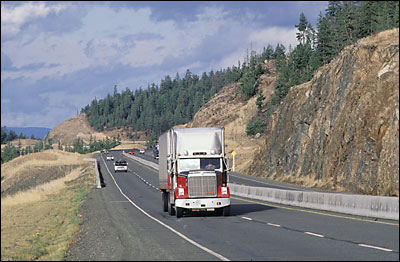 |
|
Ministry OverviewThe Ministry of Transportation plans transportation networks, develops and implements transportation policies, provides transportation services, and administers various transportation-related acts and regulations. This mandate is set out in section 5 of the Ministry of Transportation and Highways Act. Ministry ResponsibilitiesTo accomplish its mandate, the ministry:
Primary Customers and ClientsThe Ministry of Transportation works to meet the needs of:
Partners in TransportationThe ministry works closely with other groups that have transportation-related responsibilities, such as the federal government, local governments, British Columbia Ferry Services Inc., TransLink and the Insurance Corporation of British Columbia. Where possible, the ministry shares the costs of projects that serve a common interest. Crown Corporations and CommissionsThe Minister of Transportation is responsible for the following Crown corporations and commissions: BC Transportation Financing Authority The BC Transportation Financing Authority (BCTFA) makes investments in transportation infrastructure and finances these investments through borrowing and dedicated taxes. The BCTFA is a Crown corporation with no dedicated full-time staff; management is provided by staff at the Ministry of Transportation. The principles of prudent and transparent fiscal management and sustainable transportation financing are at the core of the mandate of the BCTFA. In February 2003, the government announced the first phase of a 10-year Transportation Investment Plan and a 3.5 cents per litre motor fuel tax dedicated to financing the Plan. These revenues flow directly — by legislation — to the BCTFA. Future Annual Service Plan Reports will include audited financial statements that demonstrate how these funds have been used. BCTFA activities are covered in this service plan. BC Transit BC Transit is a Crown corporation charged with providing public transportation throughout the province, outside of the Greater Vancouver Regional District (GVRD). Within the GVRD, transit services are provided by TransLink. BC Transit's web site is located at http://www.bctransit.com. Rapid Transit Project 2000 Rapid Transit Project (RTP) 2000 Ltd. is a provincially-held company incorporated under the Company Act. Its primary mandate is to design and construct the Millennium Line, which links Vancouver and New Westminster via the Broadway-Lougheed corridor. TransLink opened the Millennium Line on August 31, 2002. The project is continuing with the construction of one more station and guideway at Vancouver Community College, which is expected to be completed in early 2006. The RTP 2000 web site is located at http://www.rapidtransit.bc.ca. British Columbia Railway Company The British Columbia Railway Company is a commercial Crown corporation with three principal business units: BC Rail; BCR Properties; and BC Rail Partnership. In November 2003, legislation was approved which will permit agreements to facilitate the provision of rail freight and passenger services by third parties on lines owned by the Company. An agreement was signed on November 25, 2003, that will allow CN Rail to provide rail freight services. BC Rail's web site is located at http://www.bcrail.com. Motor Carrier Commission The Motor Carrier Commission regulates commercial passenger carriers, such as taxis and buses. Every commercial passenger carrier that operates in British Columbia must hold a motor carrier license, along with a motor carrier certificate and plate for each vehicle in the carrier's fleet. Commissioners examine applications for new and altered motor carrier licenses. The Motor Carrier Commission's web site is located at http://www.th.gov.bc.ca/mcc/mcc.htm. A description of the legislative environment under which the Transportation ministry and Crown corporations operate is provided in Appendix 3.
|
|||||||||||||||||
|
||||||||||||||||||

